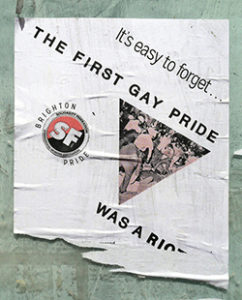Many of us have shown our inclusive faith by participating in Pride parades around the country. This is critical to counteract the ongoing fallacy that all, or even most, people of faith stand in opposition to LGBTQ rights. Religious groups who protest Pride celebrations alienate many of the attendees and can even re-awaken the pain of religious rejection. Your presence can make a big difference by showing that there is a different way for people of faith.
 It is important, too, to know the history of Pride; it is not just a party. It began as a commemoration of the Stonewall Riots that began on June 28, 1969. In an era when police routinely harassed LGBTQ people, raiding gay bars and arresting those present, patrons began to fight back. When this happened at the Stonewall Inn, a riot ensued. In 1970, LGBTQ activists commemorated the event and the rest is history as Pride has spread all over the world.
It is important, too, to know the history of Pride; it is not just a party. It began as a commemoration of the Stonewall Riots that began on June 28, 1969. In an era when police routinely harassed LGBTQ people, raiding gay bars and arresting those present, patrons began to fight back. When this happened at the Stonewall Inn, a riot ensued. In 1970, LGBTQ activists commemorated the event and the rest is history as Pride has spread all over the world.
To learn more about the history of Pride, check out these resources:
- GLAAD, the media activist group, notes the importance of Pride for the community
- A recent article from Quartz on some of the women present at Stonewall in A Lesson on Civility from the Stone Wall Riots
- Baruch College of the City University of New York offers this history of the event and contextualizes the uprising at the Stonewall Inn with other riots for labor and civil rights in New York.
- PBS’s American Experiences series includes this installment on the Stonewall Uprising (the video would be great for a discussion group).


